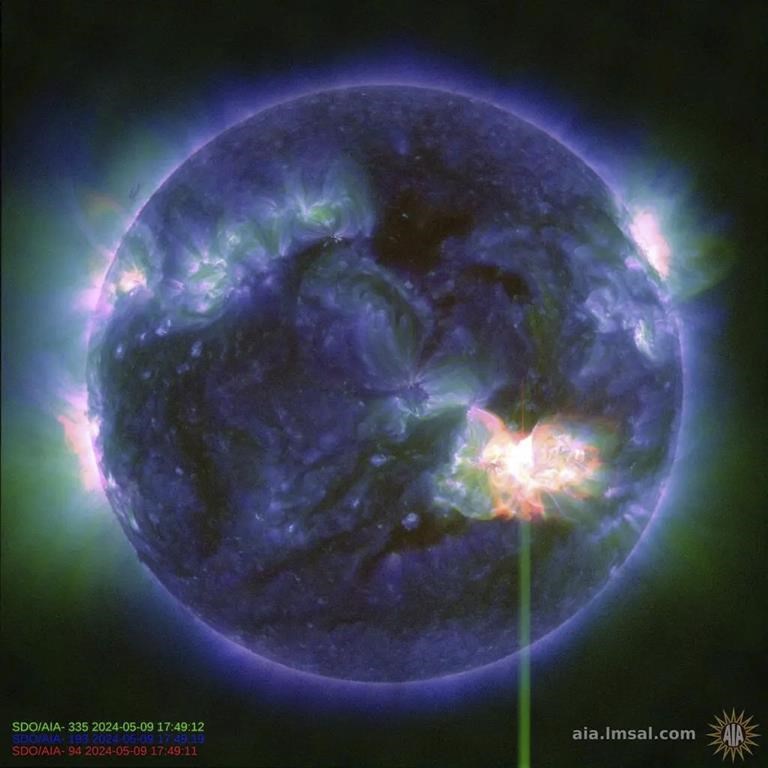Major solar storm hits Canada, bringing risks and prospect of spectacular aurora

Posted May 10, 2024 05:19:54 PM.
Last Updated May 10, 2024 07:10:24 PM.
Canada’s space weather agency warned Friday of a “major geomagnetic storm” that was hitting the country and could have severe impacts on power systems, satellites and other infrastructure.
Space Weather Canada said the storm associated with massive solar flares was striking all of Canada Friday afternoon.
The U.S. National Oceanographic and Atmospheric Administration issued its first geomagnetic storm watch since 2005 and said the storm was a “potentially historic event.”
Such events can cause faults in power grids, and Space Weather Canada says major storms like the one hitting Friday were also associated with very high risk of affects on geostationary satellites, and potential severe disruption to activities involving geomagnetism, including aerial surveys and directional drilling.
It could also make the northern lights visible across all of Canada on Friday night.
Robyn Fiori, a research scientist at the Canadian Hazards Information Service of Natural Resources Canada, said the storm was caused by “coronal mass ejections” from the sun, sending vast amounts of solar matter towards Earth.
Each eruption, the result of solar flares, can contain billions of tonnes of plasma and magnetic field from the sun’s outer atmosphere, or corona.
Fiori said three such ejections were “piggybacking on each other” to deliver a “really big blow” to the planet. One had arrived Friday and the other two were expected overnight, she said.
“When that CME arrives, our magnetic field starts to fluctuate and those fluctuations can have impacts in power systems … there can always be a danger that there could be an outage to the power system if these fluctuations get to be too big.”
In 1989, Quebec suffered a nine-hour blackout after a powerful solar flare.
Fiori said Canada’s power operators and scientists were closely watching.
“I believe that they are fully prepared for it. This isn’t something that the hydro companies are unfamiliar with,” said Fiori.
“This is something that they know to be aware of, and they have mitigation measures in place and they know how to handle that to make sure that they can minimize any kind of impact that would be felt.”
A spokesman for electricity provider BC Hydro said it had been preparing for the solar storm, and such events could potentially cause serious damage to high-voltage transmission systems, leading to outages.
Kevin Aquino said while those effects weren’t expected, BC Hydro staff were monitoring for any impacts.
Space Weather Canada said the storm warning would be downgraded late Friday to a storm watch that would last until Saturday afternoon.
Fiori said the sun had been experiencing intense flare activity over the past 10 days, with 16 X-class flares, the most powerful class of flares
“The last time we saw 16 flares in a month was maybe 10 years ago,” said Fiori.
The flares seem to be associated with a sunspot that’s 16 times the diameter of Earth, according to NOAA. It’s all part of the solar activity that’s ramping up as the sun approaches the peak of its 11-year cycle.
Fiori said that in addition to the risk posed by the solar storm there was a possibility of a memorable show by the northern lights.
“I really hope that the activity continues for another five or six hours so we can see it in Ottawa,” said Fiori on Friday afternoon. “I’d love to be able to show that to my kids.”
— With files by The Associated Press.
This report by The Canadian Press was first published May 10, 2024.
Nono Shen, The Canadian Press








